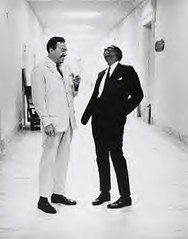
The late US Congressman from Harlem, Adam Clayton Powell, outside his office in Washington, D.C. with the-then Chairman of the Student Nonviolent Coordinating Committee (SNCC), Stokely Carmichael in 1966.
Originally uploaded by Pan-African News Wire File Photos
by Kim Pearson
NPR and Fox contributor Juan Williams is catching flak after his televised comments last night that First Lady (and Blogher contributor) Michelle Obama "has this Stokely-Carmichael-in-a-designer-dress thing going" and that she'll be an "albatross" for President Obama. Williams made the comment in an appearance on The O'Reilly Factor alongside BlogHer Contributing Editor Mary Katharine Ham.
The liberal media advocacy organization, Media Matters for America, has the video:
Media Matters notes that Williams also accused the First Lady of having this kind of "militant anger," although the basis of that assertion was not made clear. Whatever he meant, his linking of Obama to the late radical activist Kwame Toure (ne Stokely Carmichael) has upset some folks.
Gina at Michelle Obama Watch sees a pattterm:
Couple this with the Politico report calling Michelle Obama a “Frenemy” of the White House and its clear that certain sectors of the media are launching a preemptive strike against Michelle Obama.
Adam Serwer sees a parallel between Williams' dis of Mrs. Obama and the misogynistic taunts of gangster rappers:
This isn't an isolated statement about something someone said last year, it fits into an established narrative of who black women are.
Rather than being the hyper-sexualized Jezebel popular in rap music, she's portrayed as the masculine ball-buster, the kind of women ignorant men write "why I don't date black women" essays about, trying to convince themselves that there's something rational about hating the kind of woman who gave birth to you.
Serwer's comment reminded me of photography scholar Carla Williams' classic essay, Naked, Neutered and Noble, which explored the constricted lenses through which black women are viewed. She opens the essay with this quote from Maya Angelou:
The larger society, observing the [black] women's outrageous persistence in holding on, staying alive, thought it had no choice save to dissolve the perversity of the Black woman's life into a fabulous fiction of multiple personalities. They were seen as acquiescent, submissive Aunt Jemimas who showed grinning faces, plump laps, fat embracing arms, and brown jaws pouched in laughter. They were described as leering buxom wenches with round heels, open thighs, and insatiable sexual appetites. They were accused of being marauding matriarchs of stern demeanor, battering hands, unforgiving gazes, and castrating behavior.
The folks at Feministing were thinking along the same lines:
Where Juan Williams sees a militant, a victim, an albatross, most women see dignified strength, intelligence, grace, and independence.
Williams' invocation of the late Kwame Ture is kind of interesting -- I wonder how many Americans even know who he was?
Born in Trinidad in 1941, Carmichael was a student at Howard University who became captivated by the non-violent students' civil rights movement in the early 1960s. He rose through the ranks of the Student Non-violent Coordinating Committee (SNCC) to become its chairman. In that capacity, he helped mount major voter registration efforts and played a key role in the effort to unseat the Dixiecrat Mississippi delegates to the 1964 Democratic Party convention.
In the wake of a string of murders of civil rights workers, Carmichael broke with King and moved toward ethnic nationalism, including an assertion of the right to self-defense. He co-authored a book with political scientist Charles Hamilton, Black Power, that argued for collective political and economic action. He was briefly allied with the Black Panthers, but left that group in a dispute over ideology and tactics, and left the United States to live in Africa. During this time, he changed his name to Kwame Ture.
Ultimately, Ture became a committed Marxist-Leninist, founding the Pan-Africanist All African People's Revolutionary Party. Although his Party never attracted many adherents, Ture remained in demand as a public speaker on college campuses until his death from prostate cancer in 1998.
As the writer for the acclaimed documentary series, Eyes On The Prize, Williams would be familiar with Ture's biography. Of course, all of us who were students of 20th century African American politics would have read Ture and critiqued his work. Given that, it's hard for me to see how Williams could characterize an establishment figure such as Michelle Obama that way with any intellectual integrity. It's sloppy, sexist and beneath him. One expects more dignity and rigor from Juan Williams. I hope he'll be more thoughtful in his critiques in the future.
No comments:
Post a Comment